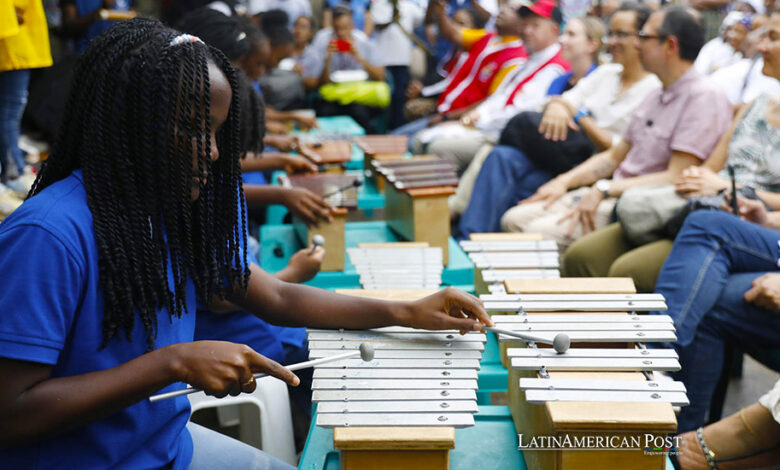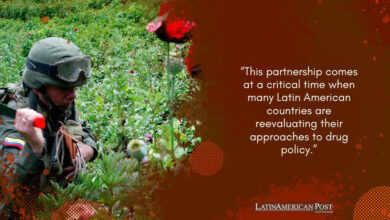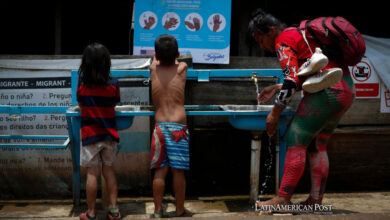Colombian Village Women Resist as Children Forget Roots for Tech

In the Colombian jungle town of Bojayá, ravaged by guerrilla warfare, Afro-Colombian and Indigenous women have become cultural guardians, teaching forgotten traditions to the technology-distracted youth.
In the remote Colombian town of Bojayá, nestled deep within the jungle and marked by a history of violent conflict, a group of Afro-Colombian and Indigenous women have emerged as beacons of cultural preservation. Over the past five years, these women have dedicated themselves to being “voices of resistance,” ensuring that the community’s children reconnect with their ancestral roots, which are at risk of being overshadowed by the influx of modern technology.
The Tragedy of Bojayá and Its Cultural Aftermath
Bojayá’s story is one of resilience in the face of adversity. The town became internationally known following a horrific event on May 2, 2002, when FARC guerrillas launched a gas cylinder bomb at the village church, killing nearly a hundred residents who had sought refuge during a fierce battle with paramilitaries. This massacre left an indelible scar on the community, altering the lives of survivors forever and disrupting the transmission of cultural traditions to younger generations.
As modern technologies like television and cell phones became more accessible, many children in Bojayá grew up disconnected from the games and stories that had animated their parents’ and grandparents’ childhoods. However, amidst the ruins of the destroyed church, a group of determined women saw an opportunity to heal and rebuild their community’s spirit by nurturing its cultural heritage.
The Role of the Cantadoras
Among these women is María Eugenia Velásquez, known affectionately as ‘Mayito’. She leads the cantadoras, a group of women who perform ‘alabaos’—traditional funeral hymns and songs of praise. These songs, rich with the community’s emotional and historical essence, have become a vehicle for passing on culture and history.
The children, referred to as ‘semilleros’ or seedlings, range in age from eight to fourteen. They gather in groups of forty to fifty per village, eagerly absorbing lessons that their schools do not offer. The teachings are not limited to songs but include traditional games and the medicinal uses of local plants, knowledge that is invaluable in a region with limited access to conventional healthcare.
Cultural and Medicinal Traditions
In Pogue and Bellavista, two villages within Bojayá, the traditions of the Indigenous and Afro-descendant communities have survived the tragedy, thanks in large part to the women’s dedication. During the 22nd anniversary of the massacre, hundreds of children participated in commemorative activities, demonstrating their engagement with their heritage by playing traditional games among the ruins and learning about medicinal plants at the local educational institution, Cesar Conto.
The importance of these traditions extends beyond cultural preservation. In a region where the nearest health center can be a 12-hour boat ride away during the rainy season, knowledge of medicinal plants is not just educational but essential for survival. The cantadoras emphasize this point, teaching the uses of these plants and the importance of sustaining natural healing practices.
Challenges and Hopes for the Future
Despite their enthusiasm and dedication, the cantadoras face significant challenges, primarily due to funding. Financial constraints hinder their desire to expand their educational efforts to other villages, putting the sustainability of their work at risk. Nevertheless, they remain committed to their mission, hoping to secure support that would enable them to reach more children and ensure that Bojayá’s rich cultural heritage is not lost to future generations.
The ‘semilleros’ themselves are aware of the importance of their role. Jimmy Murillo, a young group member, expressed his gratitude for the project and his ambition to one day teach others, thus continuing the cycle of knowledge and preservation. His sentiments reflect a broader commitment within the community to maintain and celebrate their cultural identity.
Also read: Colombian Government Reports Huge Losses in Victim Fund 2018-2020
The efforts of Bojayá’s women to preserve and pass on cultural traditions in the face of modern challenges are a poignant reminder of the power of community and the enduring strength of cultural identity. As they teach the next generation to value their heritage, these women act as custodians of history and as architects of a future where tradition and modernity coexist. Their story is a testament to the resilience and perseverance that define many small communities across Latin America, where culture and history are the most substantial ties that bind.





